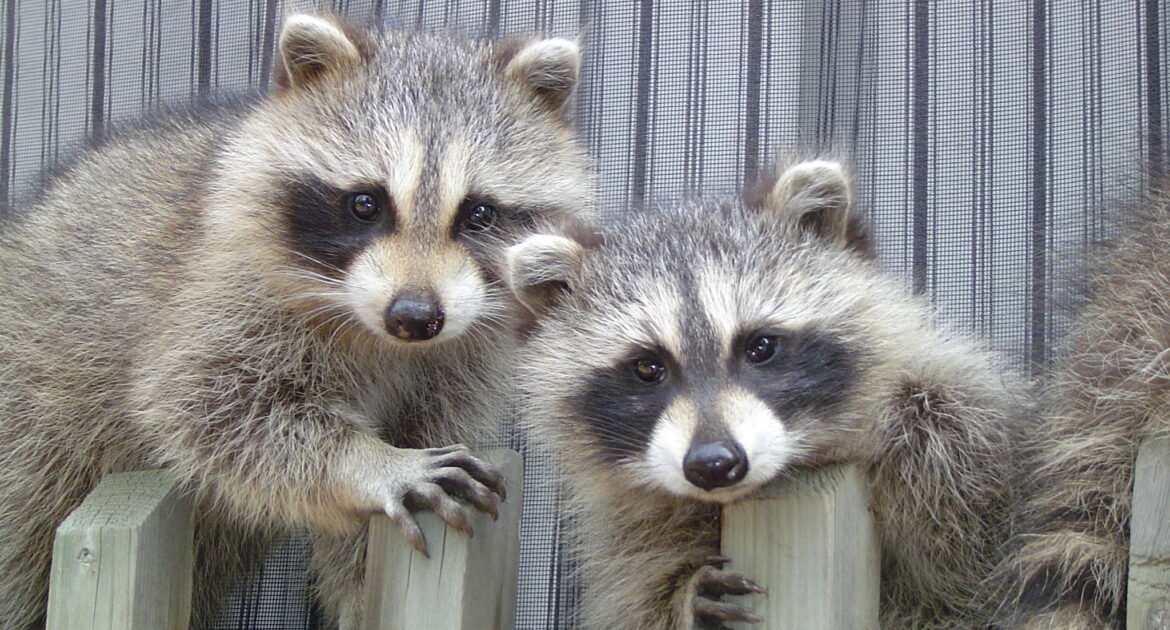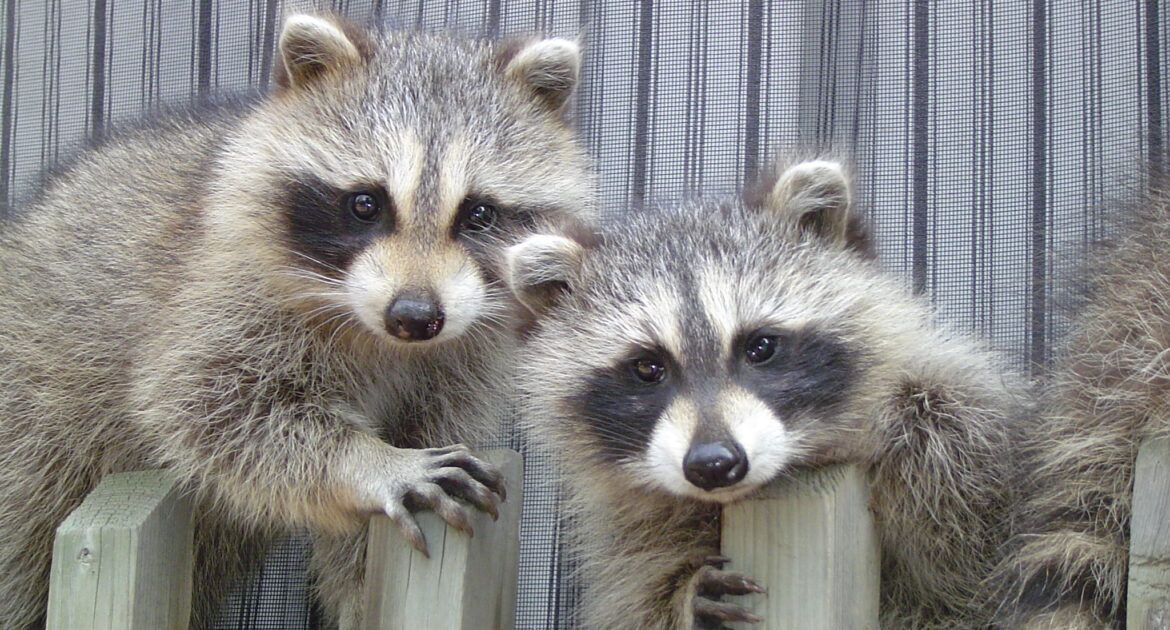Do you know what to do if you encounter wildlife in your home? Should you pick it up? Is it at all dangerous? It really all depends on many factors, but these suggestions are meant as a guideline only. Always remember “safety first“, and “when in doubt, call the professionals.
Here are the top 10 things you should avoid if you encounter wildlife in your home
1: Don’t Pick Up Baby Animals or Take Them Home
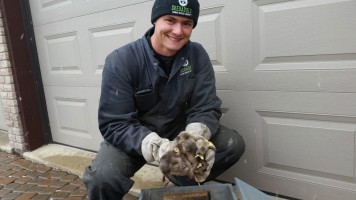 Wild animals need to stay within their own natural habitat, and we should not be making pets of them. You might think they are cute, but their parents think so too, and won’t appreciate your actions. It is also illegal to keep a wild animal as a pet without having a license. If you find a baby bird or animal who looks abandoned or injured, your first course of action should be to call the local wildlife organization or city. Your local wildlife organization will have the proper training and equipment to remove the babies safely, humanely, and reunite them with their mother.
Wild animals need to stay within their own natural habitat, and we should not be making pets of them. You might think they are cute, but their parents think so too, and won’t appreciate your actions. It is also illegal to keep a wild animal as a pet without having a license. If you find a baby bird or animal who looks abandoned or injured, your first course of action should be to call the local wildlife organization or city. Your local wildlife organization will have the proper training and equipment to remove the babies safely, humanely, and reunite them with their mother.
2: Don’t Feed the Animals
Feeding wild animals may be fun and seemingly harmless, but it teaches wildlife that humans mean food. In the future, they may aggressively approach people looking for food, with disastrous consequences for the wildlife and the people. If the animal senses that you’re a reliable source of food and it’s generally friendly, it may make attempts at obtaining more food from you.
3: Avoid removing the animal yourself
Animals are known to carry diseases and parasites. If you get bitten or scratched by the animal you are trying to remove, it may have serious health consequences.
There are some crucial points to consider if you’re thinking about dealing with wildlife issue yourself.
Important points to consider:
- Do you have the ability to accurately pin-point all potential entry points into your home?
- Are you able to implement re-entry prevention methods?
Are you aware of the times and seasons that wildlife are by law permitted to be removed or relocated?
- Are you able to remove the animal without separating it from its babies?
- Can you decontaminate your attic after various infestations?
- Are you able to replace/replenish your attic insulation in case of damage
If you are not able to answer yes to the above questions and do the work, statistics have shown the animal will make another attempt at getting back into their nest or den site; probably within the next day. If they have babies, they have a lot invested in their nest or den site and getting back in for them is a priority. Removal and prevention has to be done humanely, and in the right order so stress on the animal is minimized and the transition is smooth for both the homeowner and the animal.
4: Don’t use animal traps
It’s a commonly held belief among the public that wildlife will fare better if removed from an urban environment and released in the countryside. In reality, studies by the Ontario Ministry of Natural Resources and other organizations have shown that mortality rates for wildlife increase significantly when they are removed from familiar surroundings.
Urban wildlife species have developed very different patterns and skill sets for finding food and water and cannot immediately adapt to rural surroundings. A dramatic change in environment, especially for babies or juvenile animals often leads to starvation. In the case of squirrels, being separated from their hoarded food sources will result in certain death.
Locating shelter is another issue; wild animals generally occupy multiple den sites within their home range but when released far from home they have to start all over. That usually means conflicts with animals already in that territory or travelling many kilometers in search of new den sites. Locating suitable shelter becomes especially problematic during harsh winter months.
5: Avoid cornering the animal
If for some reason you have to engage the animal, or have encountered it while doing your own business in your home or outside, do your best not to make sudden movements that may seem to be an attempt at cornering the animal. When an animal like a squirrel or raccoon feels they are in danger, and feel cornered, they tend to act out in self-defense. This is especially likely to have this occur if it is baby season and the mother animal feels you are threatening her young. You should particularly avoid cornering skunks, as they inclined to spray when feeling threatened.
6: Avoid accidentally locking the animal in your attic or walls
Some home owners believe a way to rid themselves of a wildlife issue is by locking the animal in their attic or walls and disabling them from getting out or in. For starters, if a wild animal like a squirrel or raccoon finds itself locked in their den site, it won’t lie down and die. It will make every effort to get back out and if that involves creating more damage it won’t hesitate to do so.
The additional damage to your home will only become more costly, and if it does die, you will still have to deal with the damage it created while it was alive, along with the odor it leaves behind after it has passed. The scent left behind may attract other animals. A dead animal in a home owner’s walls or attic doesn’t simply go away with time; even if it’s dead it has to be removed as soon as possible.
7: Avoid doing the cleanup yourself
Animal urine and feces left behind may be harboring harmful viruses and parasites. Over time, strong odors from urine and feces will soak into building materials and fill an entire home. In nature, squirrels and birds build their nests using grass, leaves, twigs and just about anything else they can carry. When these animals take up residence inside your attic or vent pipes they bring along large amounts of the same material. Severely blocked ventilation systems can cause appliances in your home to overheat and fail.
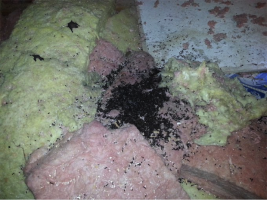
contaminated insulation
Most animals are also carriers of ticks, mites and fleas. Once the host wildlife has been evicted from their den, these nasty little parasites will often migrate into the home in search of a new home. The good news is that in most cases they can’t live on humans, the bad news is that they can still bite and irritate you as they search for a blood meal.
You should also not leave contaminated insulation in your attic. It may be contaminated with urine and feces. The insulation will also be tamped down, so it will not insulate your home effectively anymore.
A reputable wildlife control company usually has all the necessary resources available to properly clean and sanitize a den site and restore the insulation and should be called if an attic cleanup is necessary.
8: Don’t think because an animal left on its own or you don’t hear it anymore that your wildlife problem is solved
If an animal was able to find its way into your home, chances are others will as well. Prevention is key. Successfully keeping unwanted guests out of your home long-term involves identifying and blocking any and all entry points
9: Don’t try to do the prevention work yourself
More often than not wildlife entry points will be found well off the ground. This can make things tricky for homeowners who lack the necessary equipment and experience to safely climb ladders and scale roofs
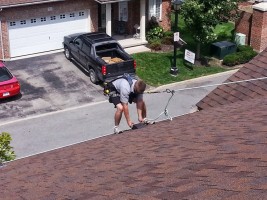 Some of people’s s roofs can be both steep and dangerous. That’s why proper ladder safety and fall protection training is so necessary. In this case, our technician is secured to an anchor point at the peak of the roof through the use of a fall restraint system. This allows him to safely perform work and get up and down the roof.
Some of people’s s roofs can be both steep and dangerous. That’s why proper ladder safety and fall protection training is so necessary. In this case, our technician is secured to an anchor point at the peak of the roof through the use of a fall restraint system. This allows him to safely perform work and get up and down the roof.
This sort of roof repair is not something your average DIYer is equipped or trained to take on and the results could be catastrophic. Working at heights should never be taken lightly and ought to be left to properly trained professionals.
10: Don’t use poison
Companies often tell potential customers that pesticides and poison are humane and safe. Nothing could be further from the truth. Most are acutely toxic and cause animals to suffer immensely. Often times when the animals die, it is eaten by another animal on the food chain, and that animal becomes sick from the poison and dies. The cycle continues. Another danger of using poison is that children or household pets may get exposed to the poison, causing severe health effects. Not only is it cruel, but it is not effective way to resolve problems More animals will move in from surrounding areas and will the newly vacant spaces.
If you have wildlife problem do the humane thing and call Skedaddle Humane Wildlife Control. Our work is guaranteed for life and our commitment to professionalism and customer service is equal to none. After our thorough process is complete, we will have humanely removed the wildlife from your home, cleared and repaired any damage, and protected your home from future unwanted animal visitors.
Call 1.888.592.0387.
Proudly serving: Ottawa, Montreal, Halifax, Hamilton, Burlington, Oakville, Mississauga, Brampton, Kitchener-Waterloo, Guelph, Cambridge, Sudbury, St. Catharines and the Niagara Region.
